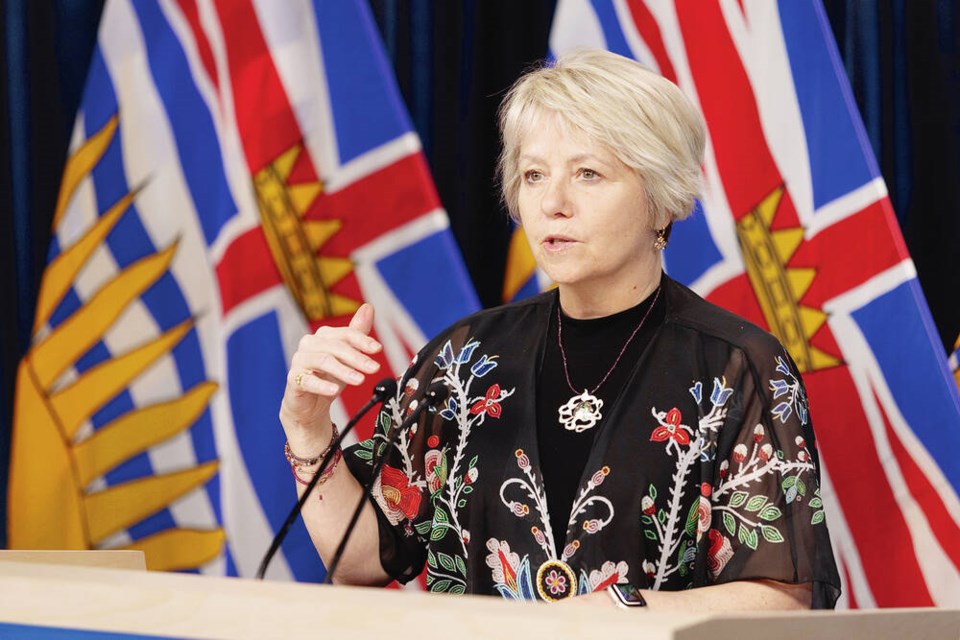The provincial government is rejecting provincial health officer Dr. Bonnie Henry’s recommendation that it provide regulated hard drugs without a prescription to people who would otherwise risk their lives using toxic street drugs.
Mental Health and Addictions Minister Jennifer Whiteside said Thursday that while the provincial health officer is an important independent voice on public health, “this is a topic we do not agree on.”
“The province will not go in the direction of compassion clubs and other non-medical models of distributing medications,” said Whiteside.
Whiteside said the province’s focus is on expanding access to treatment and mental-health and addictions care, and “cracking down on predatory drug dealers who are trafficking and dealing these toxic drugs.”
In an online news conference Thursday, Henry said non-prescription drug alternatives could be given and consumed in supervised settings such as an overdose-prevention site or compassion club. “We owe it to those affected, to those lost, and those who love and miss them to explore what might be possible to help save lives and reduce harms from unregulated drugs,” she said.
A non-prescribed regulated supply of drugs could include anything that’s in the toxic street-drug market, such as heroin, fentanyl-like drugs, or cocaine in injectable or smokable form. “We’re not talking about just handing out free drugs to people,” said Henry. “What we’re talking about is supporting people who are using drugs, who are at risk of death every day, in a way that connects them to services, [and] helps them live a more healthy, fulfilling life.”
B.C. Premier David Eby previously rejected the idea of distributing drugs without supervision by medical professionals.
Henry’s recommendation, part of an 88-page report called “Alternatives to Unregulated Drugs: Another Step in Saving Lives,” follows a similar call by Lisa Lapointe in January, before she retired as B.C.’s chief coroner.
Henry’s original report in February called for expanded access to prescribed alternatives such as hydromorphone, introduced in 2020.
Prescribed alternatives to street drugs — so-called safer supply — have been controversial amid reports that users are selling them to get money for stronger street drugs.
Federal Conservative Leader Pierre Poilievre and Alberta Premier Danielle Smith have said that drugs from the program are being diverted elsewhere in Canada.
Opposition Conservatives and BC United have said diversion of safer-supply drugs like hydromorphone to the street market is raising the risk of new users, including youth, becoming addicted. Solicitor General Mike Farnworth has said there’s no evidence of widespread diversion of safer-supply drugs.
BC United Leader Kevin Falcon and B.C. Conservative leader John Rustad on Thursday rejected Henry’s suggestion. Both said Henry would not be provincial health officer if they were running the government.
Rustad called the recommendation to provide non-prescription hard drugs “irresponsible,” saying people don’t want their “hard-earned tax dollars” buying drugs to keep people in a state of addiction.
Rustad said he would end safer supply and decriminalization — which allows people to use drugs in a home, shelter or supervised consumption site — and focus on short- and long-term treatment and recovery options. “We’ve got to get people on a path to recovery. Keeping people high on drugs is not the answer.”
Falcon said the province should focus on free treatment and assistance in recovery, not giving people more access to alternative drugs.
“I don’t want to stigmatize drug users,” he said. “But I definitely want to stigmatize drug use, the same way we stigmatize smokers when we said we’re not going to allow open use of smoking in public spaces and beaches and parks and playgrounds and office buildings and restaurants.”
The B.C. Greens supported Henry’s recommendation, saying in a statement: “Ignoring expert advice in favour of sensational headlines and political narratives is dangerously irresponsible.”
Dr. Bernie Pauly, a UVic professor in the school of nursing and a scientist with the Canadian Institute for Substance Use Research, said research shows people who received an opioid prescription under B.C.’s safer-supply program were 55 per cent less likely to die in the week following, and 89 per cent less likely to die after four days of the prescribed supply.
Yet many people who use drugs can’t access a prescribed pharmaceutical alternative, she said, because they’re in remote and rural locations or don’t have a diagnosed substance-use disorder.
Victoria hospitalist Mark Mallet, who supports harm-reduction measures but has argued safer supply should be prescribed and use witnessed, said “a much more rigorous evidence-based approach” is needed before B.C. ventures into non-prescription supply of hard drugs.
Mallet said the evidence supporting safer supply is limited, and potential harms of the program have “hardly been studied.”
“We cannot responsibly expand such a potentially harmful program without first gathering good evidence both of benefit, and also of absence of harm.”
Henry stressed that providing regulated non-prescribed drug alternatives would not come at the expense of treatment and recovery. “The rhetoric that we’ve heard in the last few months has really painted this as either/or, and I want to be very clear that I think this is one of the pieces that we need to continue to talk about.”
The provincial health officer said she envisions a day when people who use drugs “are not at the mercy of an unregulated supply and system that puts their lives at significant risk.”
The toxic drug supply has killed 14,000 people since 2016. Last year was the deadliest year yet for toxic drug deaths, with 2,511 recorded.
Synthetic opioid fentanyl-like drugs have been detected in more than 80 per cent of drug-poisoning deaths since 2017.
— With The Canadian Press



